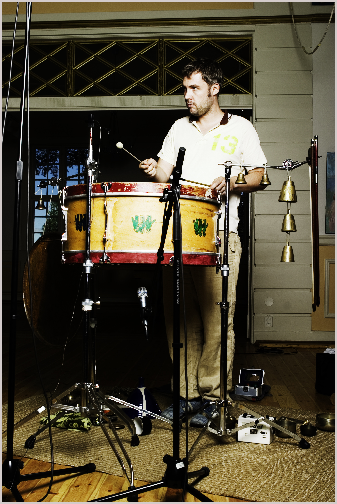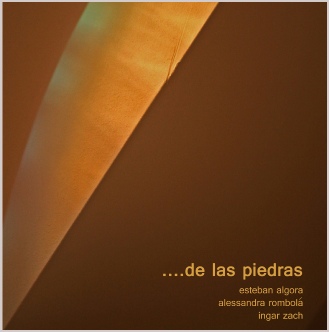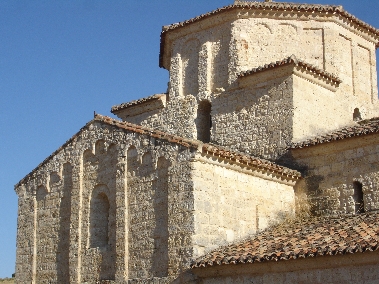Another Timbre TimHarrisonbre

INTERVIEW WITH INGAR ZACH, MARCH 2008
‘....de las piedras’ by Esteban Algora, Alessandra Rombolá & Ingar Zach was released in June 2008
How long has the trio with Esteban Algora and Alessandra Rombolá been in existence, and how did this group come about?
I got to know Esteban and Alessandra when I moved to Madrid in 2004. Esteban is a very special musician and he is the first choice on accordion in Spain, when it comes to contemporary music. Esteban and Alessandra have played together for a long time, in duo and in other constellations such as the trio MEI (with Horacio Curti on shakuhachi), where they exclusively play Japanese music, both traditional and contemporary. Alessandra and I play together with Rhodri Davies in MUTA . Esteban, Alessandra and I had our first and so far only performance as a trio in Madrid in March last year. We wanted to play together and investigate the combination of instruments. And after the concert we all felt that this was certainly something to take further.
We decided to call Pierre Olivier Boulant from Toulouse to come to Urueňa with us,
to record music in the beautiful small stone church close to Valladolid. So, basically
the trio is very fresh still, but right now, we have lots of plans, and we are all
three very happy with the outcome of the recording.
The church has a very particular acoustic that you are clearly exploiting in the music. Could you tell us about this?
Yes, Alessandra recorded her solo cd there in 2005, and we both fell in love with
the place and the acoustics. After our first concert we decided that it would be
very natural to choose a space for the recording which had a special and reverberant
acoustic, and we immediately thought about the church. We wanted our sounds to melt
together in the space, and work on the total group sound where the room became a
fourth member of the group in a way.
Could you explain the title of the disc, and of the individual tracks?
As it is an old stone church we thought it would be a nice connection to name the tracks after minerals, and the title of the cd, ‘...de las piedras’ (which means, "...of the stones") could give the listener a sense of understanding of the space we are playing in. Alessandra also uses tiles which gives a direct association to the sound of stones. It's nice to try to find connections between the music and the titles, even if sometimes the connection can be very vague. But in this case I feel we managed to find titles that have some kind of meaning with the music.
Much of '....de las piedras' sounds like contemporary classical music. How much
of the music was at least partly composed or at least pre-planned?
I don't think of it like that. In fact I don't even try to separate or distinguish between composed and improvised. What we do in the trio is to talk about sounds we like, and also different possibilities of structure and form. And then we try to improvise with the material and/or structure we have agreed upon. In the recording I think we had 7-8 ideas in total, and we did three or four versions of all of them. Finally we ended up choosing just six, because it made sense musically and we thought the form of the cd worked well with the final six tracks.
You and Alessandra also play in the trio MUTA, with Rhodri Davies rather than Esteban Algora, and have produced an excellent cd on the Sofa label. Given that two thirds of the group is the same, how similar are these two trios?
In the way of working the two trios are very similar, but in terms of the music that
comes out, there are differences. One obvious difference is that MUTA is amplified
and uses electronics, while this other trio is totally acoustic. But also in terms
of the density of sounds and aesthetics there are differences. MUTA is more harsh
and noisy, while this trio is more melodic, more dynamic maybe. In any case MUTA
haven't played for a while, so this may all change the next time we meet....
In the past few years the music you play has changed in character. You seem to be being drawn more and more closely towards contemporary classical music, whilst retaining a strong commitment to improvisation. Can you say more about this?
Well, as I said earlier I don't think of it in these terms, but I guess it is the
hunger for change and development in my expression that is the reason for the change
in character. I need to use improvisation to create my music, but after playing
so-called "free improvised music" in ad hoc settings for a long time (where normally
nothing was said before or after playing), the urge to set in place limits, discuss
solutions, or predetermine structures became more important to me. It's just that
I felt that all the music I played sounded the same, even if the people I played
with changed. In the last 5 years I have deliberately focused on playing differently
in each group I’m involved in, or changing the material or instruments I use to fit
each project. Nowadays I work steadily with fixed groups, and do very little ad
hoc playing. I am into group playing and working with steady ensembles over time,
and I think that this has been the right path for me over the last five years, because
better music has come out of it.
One of your fixed groups is Looper, the excellent trio with Martin Kuchen & Nikos Veliotis, who collaborated with John Tilbury on the ‘MASS’ project (documented on Esquilo). Can you say something about Looper?
In Looper, the music flows very easily. All three of us have a very clear, common
idea of what we want to do. It’s all about layers, and how to start and stop these
layers, and where to put them dynamically and pitchwise. Silence is also very important
in this trio. That’s when all three of us stop our actions at the same spot, and
the space that this creates can be really magical. We decided to bring in John Tilbury
on MASS, and the choice was very natural to us. We didn't need another layer in
the music, but something that could be a contrast, yet still an equal part of our
sound. And we knew that John was a musician who valued time and space in a very
particular way. To me we couldn't have chosen a better musician. John is one of a
kind.
In spring 2004 you moved from your native Norway to Spain. What made you decide to
make this shift?
Actually I wanted to move to Berlin in 2004, but then I met my wife here in Madrid,
and then there was no other way really. And I don't regret it for a second!
Prior to moving to Spain you worked for several years with a number of other Norwegian musicians (Ivar Grydeland, Tonny Kluften etc.) Have you been able to maintain these collaborations from afar?
Oh, yes. The trio with Ivar Grydeland and Tonny Kluften is very active. It's called
Huntsville, and it has taken a totally different direction the last three years.
In Huntsville, I play mostly rhythmical patterns with my two snare drums, a bass
drum, an electronic tabla machine and a Cajón! Ivar works with the whole guitar
family: banjo, pedal steel guitar, acoustic and electric guitar, and Tonny plays
double bass, bass pedals and an old analogue rhythm box. It's a very bizarre mix but
it works. The method of working is kind of similar to the way I work with Looper,
although the music sounds completely different. Huntsville is minimal in the sense
that small ideas are put in motion, loops are introduced that go on for a long time,
the same groove going on for 15 minutes with very small changes. Huntsville work
with layers, and the dynamic between all the layers makes up the form of the pieces
which always last between 40 and 50 minutes.
You also played with Derek Bailey on a number of occasions and produced two duo CD's, one of his Incus label and one on your Sofa label. Derek had the reputation of being brilliant but sometimes difficult. How did you find him, and what did you learn about improvising from working with him over a period of years?
I learned a lot by just being together with him and his wife Karen. They were fantastic
company and I'm still in touch with Karen. For me there was nothing difficult in
my relationship with Derek. I am just very happy and honoured to have got to know
him and to have shared music with him.
Going back still further can you say how you first discovered 'free improvisation', and what were your
first inspirations in this area?
Difficult to say, but it was my meeting with Raymond Strid and David Staceknás in
Stockholm in 1996/97 that really got me into improvisation. Earlier I was playing
jazz, and I had difficulties in finding my voice inside the jazz-idiom.
Coming back to the present, how would you characterise the improv/new music scene in Spain today? Are there any musicians you would pick out as ones to watch?
Well, I can only say that both Esteban Algora and Alessandra Rombolá are fantastic musicians, and I am really happy to have the opportunity to work with this trio in my home town. I also work with Wade Matthews from time to time, and there are a couple of young guys; Julio Camarena and Andrés Arregui who are really playing interesting stuff. The scene is very small, and the activity is very spread, but Wade Matthews is putting on concerts in a Gallery in the centre of Madrid, and many great musicians have passed through there.
Apart from Madrid, you have Barcelona and the great musicians Ferran Fages, Pablo Rega, Alfredo Costa Monteiro, Ruth Barberan and Agustí Fernández just to name a few. There are more people up there as well, but I am not sure about recent activity. It's been some time since I've been there.
What other groups are you currently working with?
Right now I’m working with the quartet "Dans les arbres" with Christian Wallumrød,
Xavier Charles, Ivar Grydeland. We are releasing our cd in late april on ECM, and
looking forward to touring with them in May and the forthcoming summer. Huntsville
with Ivar Grydeland and Tonny Kluften. Our second cd will be out in the autumn on
Rune Grammofon with Nels Cline and Glenn Kotche as guests. Looper with Martin Kúchen
and Nikos Veliotis and John Tilbury, and the duo LabField with the Swedish guitar
player David Stackenás. Point 4 with Kenneth Karlsson, Jon Balke and Bjørn Rabben.
MUTA with Alessandra Rombolá and Rhodri Davies. Flore de Cataclysmo with Michel
Doneda and Giuseppe Ielasi. I also do solo concerts from time to time, and at the
moment I am working on my third solo disc. Hopefully it will be out before the summer.
We'll see. I also hope I will have a chance to play with Agustí Fernández. We
just finished a duo CD which will be out in June on the Norwegian label Plasticstrip.
You’ve played with many of the leading figures in improvised music, but is there anyone you'd particularly like to play with who you haven't yet had the chance to?
At the moment I am very happy with the constellations I am working with, and I haven't had time to really think about any future collaborators. Right now I have got my hands full….

‘....de las piedras’ at09
esteban algora (accordion)
alessandra rombolá (flute & tiles)
ingar zach (percussion)
